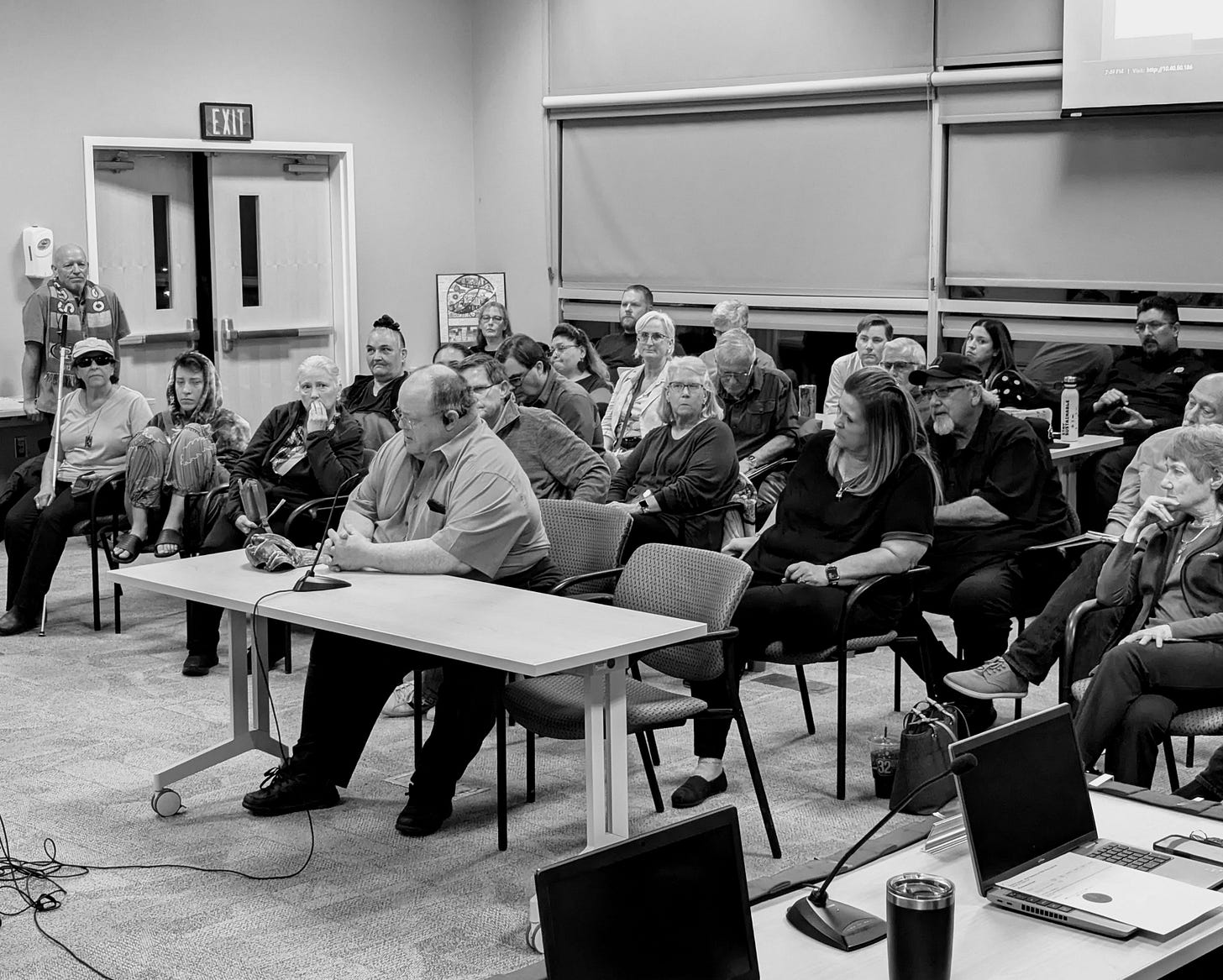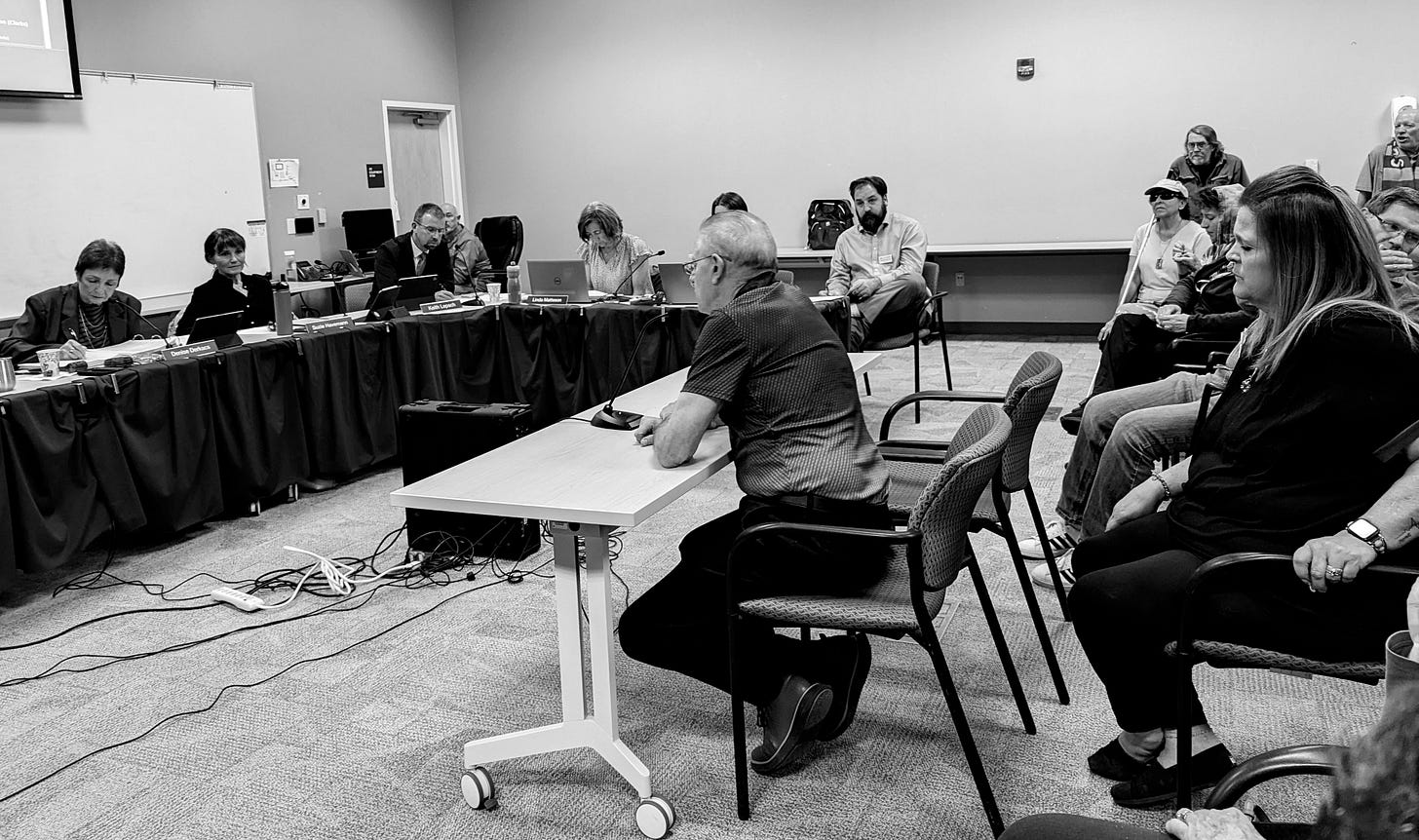Elk Ridge: “No discussion, no due process, no possible answer”
Elk Ridge mobile home park residents get update on gas-to-propane conversion, voice frustration at lack of clarity
Story and photos by Stephanie Nakhleh
Note: See our previous coverage of Elk Ridge here.
In an often emotional meeting at the Oct. 22 County Council Work Session, Elk Ridge Mobile Home Park residents learned a few more details about plans to convert their homes from natural gas to propane — though far more questions were raised than answered.
Los Alamos County Deputy Utilities Manager Karen Kendall told Council that Yes! Communities, which owns the park, has hired Cartwright’s Plumbing to survey residents' appliances and assess the feasibility of propane conversion. These surveys, conducted at no cost to residents, should be completed by the end of the month, she said. After the assessment, Yes! Communities will determine whether to proceed with propane conversion or develop an alternate plan.
Safety risks and cost burdens
Kendall said that the Department of Public Utilities (DPU) “has no intentions to shut off the gas until all conversions are complete.” Because the County discovered that mobile homes were sitting on top of natural gas lines — a situation that County staff said is both illegal and dangerous, with an unclear history — DPU continues to do monthly leak detection surveys. Another is scheduled for next week.
Residents packed Council chambers to voice concerns about safety, cost, and communication issues. Several described struggles with current housing costs, saying they pay around $900 monthly in lot rent plus utilities, taxes, and mortgage payments on the home itself. Many said they are worried about the financial impact of converting appliances to propane and its higher ongoing costs.
“I don't even pay that to the county on my utility bill,” said resident Amy Valdez, calculating potential propane costs of $800 monthly just for heating. “How am I supposed to warm my house? … I'll be homeless if this happens. I will not be able to afford it.”
“Who is a resident supposed to go to?”
The tangled ownership and jurisdictional setup of Elk Ridge — a privately owned parcel encircled by Department of Energy land — led to bewildered exchanges between councilors and staff. Councilor Melanee Hand struggled to get a clear answer on who was responsible for what: “Who is a resident supposed to go to if they have a problem, or if they need a hookup, or they need to disconnect?” she asked.
Kendall's response suggested a maze of entities to slog through: residents should start with the Yes! Communities office, she explained, but depending on which service, some issues would be handled by Yes! Communities' maintenance staff, some by the County, and some by contractors hired by either entity.
“There is no clear answer to that”
The billing structure only adds to the confusion. The Department of Public Utilities (DPU) bills residents directly for electric service and for gas from DOE/LANL through a master meter. Yes! Communities receives the water and sewer bills, though the sewage flows directly to LANL's waste processing facility rather than the county's wastewater treatment plants.
Several times, Kendall turned to the County’s legal counsel, Alvin Leaphart, for help explaining the fuzzy legal situation. He seemed reluctant to step in. Finally, Councilor Hand pinned him down, asking him directly who was responsible for the infrastructure.
Leaphart then stated simply: “There's no clear answer to that.”
This response was met with jeers from other attendees, with one Elk Ridge resident shouting, “No accountability!” before Council Chair Denise Derkacs banged the gavel to restore order.
Though a few residents expressed gratitude to County Manager Anne Laurent and Utilities Manager Philo Shelton for meeting with them in person to hear out their concerns, most residents were clearly fed up with the ambiguity over who is responsible for the gas lines. “At this point there's been no discussion, no due process, no possible answer to the question of who owns the system,” said Elk Ridge resident Phil Gursky. “We don't care that the County claims that Yes! Communities might not now own, or ever did own this. … If you run [gas lines] for 30 years and collected money on them, I don't think that's a reasonable argument to say it's Yes’s problem now.”
Gursky’s comment led to scattered applause and another gavel bang to end the applause.
“An unsafe and illegal situation”
Multiple residents expressed alarm about safety, both current and future. While earlier estimates suggested gas lines ran under 62 homes, later DPU estimates reduced that number to approximately 17. (This number has been revised several times.) Several of these residents pushed back against assertions they had been notified of lines running under their homes, saying they only learned of the situation through the conversion announcement. “Just so you're aware, I am on one of the trailers that has a gas line running under it and they didn't tell me that,” said resident Ken Mack. “I was not notified. I was asked to remove skirting from my trailer so they could inspect, and then I did get a door hanger that said there were no leaks found. It did not say that we were living in an unsafe and illegal situation.”
Another resident echoed that fear: “My biggest concern is how dangerous is it?” she asked. “We stay there every night. Are we going to wake up in the morning or is it going to explode?”
Propane downsides
Gas lines under homes are clearly unsafe, but it’s not clear how much better propane would be. One resident said that the minimum 100-gallon tanks required would mean placing about 10,000 gallons of propane throughout the densely packed community, raising concerns about explosion risks and emergency access.
“This is this is a silly conversation,” said Mack. “They can't safely put a tank in our neighborhood. I've measured the distance between my two neighbors…There is no safe place to put those tanks.”
Reliable service to the tanks is also a concern: “We don't have a propane company up here,” said Valdez. “We have to pay another service charge for that. …Days when it's snowing, well, ‘We can't get up that hill. Our drivers won't drive. It's not going to happen.’ I've had a home where we had propane, and that happened.”
What’s next?
As the Elk Ridge update wrapped up, a number of questions remained unanswered:
How dangerous is the current situation of gas lines running under the homes?
Who is responsible for the gas infrastructure: Los Alamos County or Yes! Communities?
Who will take responsibility for fixing the gas lines, if fixing them is determined to be the best course of action?
If Yes! Communities goes through with propane conversion, who will bear the cost?
Can the amount of propane needed for this community be safely stored?
Who approved placing mobile homes over gas lines in the first place, and how was that issue not caught earlier?
Why were residents not informed earlier about the issues with the gas lines under their homes?
Chair Derkacs acknowledged residents’ concerns about safety, costs, and the need for swift action, but as this was an informational item at a work session, no action was taken. The next big step is getting the survey results back on the feasibility of propane conversion, and the County says it will update its online fact sheet as information becomes available. However, as residents pointed out — and County staff tactfully confirmed — it’s been difficult to impossible to reach Yes! Communities through provided contact information.
We will continue to update this story as it progresses.





Heartbreaking.
“These guys are putting me to shame.” -- F. Kafka